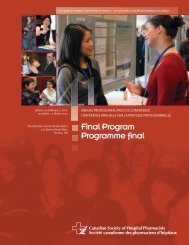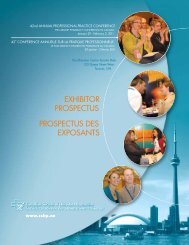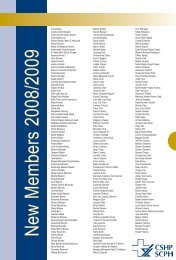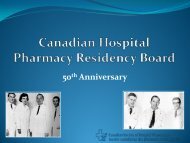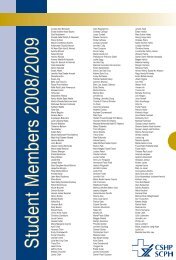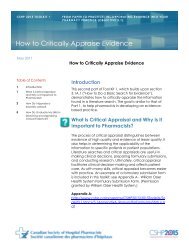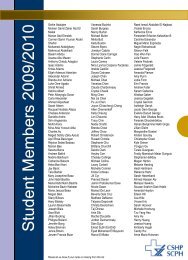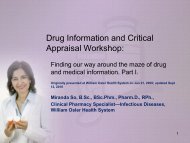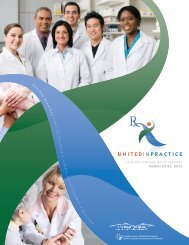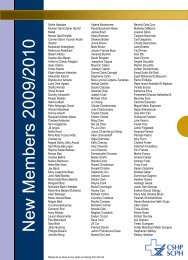Final Program - Canadian Society of Hospital Pharmacists
Final Program - Canadian Society of Hospital Pharmacists
Final Program - Canadian Society of Hospital Pharmacists
Create successful ePaper yourself
Turn your PDF publications into a flip-book with our unique Google optimized e-Paper software.
western branches<br />
british columbia<br />
alberta<br />
saskatchewan<br />
manitoba
Welcome to the 39th Annual CSHP Western Branches Banff Seminar. In 2013, our theme is The Art<br />
<strong>of</strong> Pharmacy Practice which we hope will provide you some new and unique inspiration as you<br />
practice the science, and the art, <strong>of</strong> pharmacy.<br />
The Banff Seminar Planning Committee is a group <strong>of</strong> volunteers that work throughout the year to<br />
organize this excellent conference. I would like to take the opportunity to thank them all for their<br />
time and effort they have committed towards planning speakers, activities, and other logistics <strong>of</strong><br />
this conference. Please thank them if you get the chance! They’ll be easily recognizable around the<br />
Banff Centre throughout the weekend.<br />
Our committee would also like to give a big thank you to our industry sponsors who provide<br />
us with funding to <strong>of</strong>fset some <strong>of</strong> the conference expenses. Their sponsorship ensures that our<br />
registration fees remain affordable for pharmacy technicians, pharmacists, students and others to<br />
attend the conference.<br />
We also would like to thank the speakers who have committed their time and expertise to prepare<br />
current topics and their time to travel to Banff this weekend.<br />
Lastly, and most importantly, we would like to thank you! Without your ongoing support and<br />
attendance, this conference would not be possible. I hope that you enjoy the educational<br />
components and networking opportunities throughout the weekend and get the chance to enjoy<br />
this beautiful town and national park we are in.<br />
Enjoy the weekend!<br />
Esther Jadusingh<br />
CHAIRPERSON<br />
CSHP WESTERN BRANCHES BANFF SEMINAR PLANNING COMMITTEE<br />
WELCOME
PROGRAM OUTLINE<br />
FRIDAY, MARCH 22, 2013<br />
1100-1700<br />
Registration Desk Opens<br />
1300-1315<br />
Opening Remarks<br />
1315-1330<br />
60 second poster fame part 1<br />
1330-1415<br />
Anticoagulation in Renal Impairment – A Rock and a<br />
Hard Place<br />
Patients with renal dysfunction have signifi cant<br />
physiologic changes that can predispose them to<br />
bleeding complications. While the advent <strong>of</strong> the new<br />
oral anticoagulants provides clinicians with alternatives<br />
for patients, many outstanding issues remain, including<br />
appropriate patient selection and management strategies<br />
for bleeding. This presentation will review the challenges<br />
and strategies for managing anticoagulation in patients<br />
with renal impairment.<br />
CYNTHIA BROCKLEBANK, BScPharm, PharmD, ACPR,<br />
CDE, Clinical Pharmacist, Chronic Disease Management,<br />
Alberta Health Services, Calgary, Alberta<br />
1415-1500<br />
Introduction to Rhythm Interpretation<br />
This will be an highly informative and interactive session<br />
on the basics <strong>of</strong> cardiac rhythms and 12 Lead ECG<br />
interpretation. The goals <strong>of</strong> this talk will be to understand<br />
the essentials <strong>of</strong> rhythm interpretation and to explore 12<br />
Lead ECG fundamentals.<br />
CHRIS COLTMAN, RN, BScN, Clinical Nurse Educator,<br />
CVICU Unit 94, Foothills Medical Centre, Alberta Health<br />
Services, Calgary, Alberta<br />
1500-1515<br />
60 second poster fame part 2<br />
1515-1545<br />
BREAK<br />
1545-1645<br />
CONCURRENT SESSIONS<br />
1. Prevention <strong>of</strong> Mother to Child Transmission <strong>of</strong> HIV<br />
– How LOW Can We Go?<br />
This presentation will provide pharmacists with an overview<br />
<strong>of</strong> the epidemiology <strong>of</strong> mother-to-child transmission<br />
(MTCT) <strong>of</strong> HIV, as well as risk factors for transmission.<br />
Recommendations from current guidelines regarding<br />
strategies to prevent MTCT <strong>of</strong> HIV will be reviewed, as well<br />
as results from local research. Participants will develop an<br />
understanding <strong>of</strong> the role <strong>of</strong> the pharmacist in perinatal<br />
management <strong>of</strong> HIV disease.<br />
CHRISTINE HUGHES, BScPharm, PharmD, FCSHP, AAHIVP,<br />
Clinical Pharmacotherapy Practitioner, HIV, Northern Alberta<br />
HIV, <strong>Program</strong>, Alberta Health Services, Edmonton, Alberta<br />
2. Tackling COPD Stagnation – Moving Through Old<br />
Guidelines to Apply New Evidence to Your Patient<br />
In this session, through the application <strong>of</strong> new evidence<br />
and perspectives, we will build upon basics in COPD<br />
management in order to help progress towards more<br />
effective patient-centred care. With a basis <strong>of</strong> wellfounded<br />
therapeutic outcomes, a primary focus will be<br />
to delve into the evidence supporting currently available<br />
pharmacotherapeutic options such that we can determine<br />
how best to translate potential benefi ts and harms not<br />
only to ourselves, but also to translate this information<br />
into something meaningful to patients. We will also look<br />
briefl y at the management <strong>of</strong> acute exacerbations in the<br />
community and hospital settings. The essential role <strong>of</strong><br />
the pharmacist as an advisor, educator, and advocate to<br />
patients and providers will be prominent throughout the<br />
session.<br />
JAMIE FALK, BScPharm, PharmD, Clinical Pharmacist,<br />
Family Medicine and Primary Care, Kildonan Medical Centre,<br />
WRHA, Clinical Assistant Pr<strong>of</strong>essor, Faculties <strong>of</strong> Medicine and<br />
Pharmacy, University <strong>of</strong> Manitoba, Winnipeg, Manitoba<br />
1900<br />
OPENING RECEPTION<br />
“Hawaiian Luau – Hawaiian Theme Night!”<br />
You are invited to join us for a fun night at a Hawaiian Luau.<br />
Dress up in your favorite Hawaiian/tropical outfi t (that’s right,<br />
get out your leis, tropical shirts, grass skirts…)! There will be<br />
food and drinks plus plenty <strong>of</strong> friendly competition and theme<br />
activities courtesy <strong>of</strong> CSHP BC Branch. Prizes will be awarded<br />
for the competition/theme activities and also for the best<br />
Hawaiian outfi t. So shake those hips and sway to the music as<br />
we party it up Hawaiian style!<br />
DAY 1
PROGRAM OUTLINE<br />
SATURDAY, MARCH 23, 2013<br />
800-1200<br />
Registration Desk Opens<br />
Exhibits Open<br />
815-830<br />
Opening Remarks<br />
830-945<br />
KEYNOTE<br />
Mea Culpa: A Health Pr<strong>of</strong>essional’s Personal Reflection<br />
on Medical Errors<br />
As many as 24,000 <strong>Canadian</strong>s die every year at <strong>Canadian</strong><br />
hospitals due to preventable medical errors. In the<br />
United States, it is currently estimated that as many as<br />
200,000 Americans die each year <strong>of</strong> preventable medical<br />
errors. One <strong>of</strong> the most important causes <strong>of</strong> preventable<br />
errors relate to medications. There is a signifi cant<br />
medical error in roughly one in ten medications given to<br />
hospitalized patients. The errors reported include wrong<br />
drug, wrong dosage and wrong route <strong>of</strong> administration.<br />
Other causes <strong>of</strong> medical error include transfusion<br />
reactions, wrong side surgery and hospital acquired<br />
infections. This presentation will discuss common errors<br />
and factors that contribute to errors such as fatigue and<br />
sleep deprivation. The culture <strong>of</strong> modern medicine tends<br />
to make health pr<strong>of</strong>essionals experience a deep sense<br />
<strong>of</strong> shame as a result <strong>of</strong> making mistakes. That leads<br />
to denial and rationalization <strong>of</strong> mistakes, which makes<br />
it diffi cult to learn from them and to teach others how<br />
to avoid them. Using audio clips from his radio show<br />
White Coat Black Art as well as his own experience<br />
making mistakes, Dr. Goldman will discuss the roots <strong>of</strong><br />
medical errors and how to create a culture <strong>of</strong> safety by<br />
reducing unhealthy shame and by creating a framework<br />
in which errors can be discussed more constructively.<br />
The presentation will highlight the pharmacist errors and<br />
where possible present this subject from the pharmacist<br />
point <strong>of</strong> view.<br />
DR. BRIAN GOLDMAN MD, Emergency Physician,<br />
Broadcaster and Medical Watchdog with a Passion for<br />
Compassion, Toronto, Ontario<br />
945-1015<br />
Break<br />
1015-1055<br />
Hyponatremia – Busting Myths and de-Mist-ifying its<br />
Assessment & Management<br />
Hyponatremia is the most common electrolyte derangement<br />
among hospitalized patients. Understanding why it occurs<br />
and how to manage it is far more complicated than other<br />
electrolyte disturbances because it is intimately linked to<br />
our understanding <strong>of</strong> body water, which is also a complex<br />
system. Because <strong>of</strong> the many connections between<br />
hyponatremia, hypovolemia, and drug therapies like<br />
diuretics, ACE-Inhibitors/ARBs, drug-related causes <strong>of</strong> SIADH<br />
(and drug treatments for it), and others, it is important for<br />
pharmacists to have a solid approach to hyponatremia<br />
and related disorders. In this session, we will sketch an<br />
approach to hyponatremia assessment and management,<br />
provide a basis and pathway for further learning about it,<br />
and bust several myths about sodium and water along the<br />
way.<br />
PETER LOEWEN, BScPharm, ACPR, PharmD, FCSHP,<br />
Director, Doctor <strong>of</strong> Pharmacy <strong>Program</strong>s, Assistant Pr<strong>of</strong>essor,<br />
Faculty <strong>of</strong> Pharmaceutical Sciences The University <strong>of</strong> British<br />
Columbia, Vancouver, British Columbia<br />
1055-1135<br />
New Therapies for Type 2 Diabetes – What Do We Do<br />
With Them??<br />
Over the last few years, there have been new therapies<br />
introduced for the treatment <strong>of</strong> Type 2 diabetes, including<br />
the GLP receptor antagonists and the DPP-4 inhibitors. The<br />
2008 Clinical Practice Guidelines <strong>of</strong>fered little guidance for<br />
when these therapies should be used, but what will the<br />
2013 guidelines tell us? In addition, this presentation will<br />
highlight some <strong>of</strong> the therapies currently in development for<br />
the treatment <strong>of</strong> Type 2 diabetes.<br />
RHONDA ROEDLER, BScPharm, ACPR, PharmD, CDE,<br />
Clinical Practice Leader, Foothills Medical Centre, Alberta<br />
Health Services, Calgary, Alberta<br />
1135-1205<br />
BREAK<br />
DAY 2
SATURDAY, MARCH 23, 2013…CONTINUED<br />
1205-1250<br />
CONCURRENT SESSION<br />
1. The Art and Evidence for Sedation <strong>of</strong> Adult<br />
Intensive Care Patients<br />
Sedation <strong>of</strong> intensive care patients is <strong>of</strong>ten necessary for<br />
medical and physiological reasons, and to ensure patient<br />
safety and comfort. Multiple classes <strong>of</strong> medications are<br />
<strong>of</strong>ten combined to achieve sedation goals as no one<br />
agent has comprehensive and optimal effects on its<br />
own.<br />
During this presentation, we will describe the<br />
pharmacology <strong>of</strong> the agents currently available,<br />
including dexmedetomidine as the newest addition to<br />
our therapeutic options. We will review the most current<br />
up to date evidence-based sedation practices and<br />
guidelines, and fi nally discuss the art <strong>of</strong> applying them to<br />
direct patient care.<br />
JERROLD PERROTT, BScPharm, ACPR, PharmD, Clinical<br />
Pharmacy Specialist, Critical Care, Royal Columbian<br />
<strong>Hospital</strong>, Lower Mainland Pharmacy Services, New<br />
Westminster, British Columbia<br />
2. Oncology Update<br />
CARLO DE ANGELIS, PharmD, Clinician Scientist –<br />
Oncology Pharmacy, Department <strong>of</strong> Pharmacy, Bayview<br />
Campus, Sunnybrook Health Sciences Centre<br />
Toronto, ON<br />
1900<br />
BANQUET<br />
DAY 2
PROGRAM OUTLINE<br />
SUNDAY, MARCH 24, 2013<br />
800-1100<br />
Registration Desk Opens<br />
Vendor Exhibits Opens<br />
815-855<br />
It’s Not Easy Being Short<br />
A brief history <strong>of</strong> how we found ourselves in the midst<br />
<strong>of</strong> the shortages will be outlined. Specifi cally relating to<br />
Saskatchewan, coping strategies that have been used will be<br />
described and potential coping strategies explored. Also to be<br />
deliberated the questions: Has anything positive arisen from the<br />
shortages? What are our next steps<br />
CARMEN BELL, BSP, Drug Information Consultant,<br />
Saskatchewan Drug Information Service, College <strong>of</strong> Pharmacy<br />
& Nutrition, University <strong>of</strong> Saskatchewan, Saskatoon,<br />
Saskatchewan<br />
900-1000<br />
CONCURRENT SESSIONS<br />
1. Delirium in the Elderly<br />
Delirium is a common condition in the elderly. It is<br />
associated with serious adverse outcomes. Delirium is<br />
<strong>of</strong>ten not identifi ed or misdiagnosed as another psychiatric<br />
condition such as depression or dementia. This presentation<br />
will describe the clinical presentation <strong>of</strong> delirium, identify<br />
the different etiologies <strong>of</strong> delirium and outline an approach<br />
to the prevention and management <strong>of</strong> delirium.<br />
MARLA DAVIDSON, MD, Department <strong>of</strong> Psychiatry, University<br />
<strong>of</strong> Saskatchewan, Saskatoon, Saskatchewan<br />
2. Experiential Training for Pharmacy Students: Time<br />
for Change<br />
In almost all provincial jurisdictions, legislative changes are<br />
occurring that permit pharmacists to expand their scope <strong>of</strong><br />
practice by assuming greater responsibility for managing<br />
drug therapy. These expanded roles include a variety <strong>of</strong><br />
patient-centred activities such as adapting and initiating<br />
drug therapy. However , patient-centred care requires a<br />
different set <strong>of</strong> skills (e.g. clinical practice skills, critical<br />
thinking skills, decision-making skills under conditions<br />
<strong>of</strong> uncertainty, collaborative interpersonal practice skills)<br />
than those that were needed to be a good pharmacist in<br />
the past (e.g. attention to detail, accuracy, risk-aversion).<br />
Many <strong>of</strong> the skills that pharmacists will need to succeed<br />
in the practice models <strong>of</strong> the future are best learned in<br />
experiential practice settings where students gradually<br />
assume greater and greater responsibility and accountability<br />
for the development <strong>of</strong> drug therapy treatment plans<br />
and their associated outcomes. Unfortunately, many <strong>of</strong><br />
the experiential training models that exist across the<br />
country could best be described as “observerships”, in<br />
which students are accompanied by a preceptor at all<br />
times and in which there is not an expectation that the<br />
student will play an active role in the delivery <strong>of</strong> care.<br />
This presentation will explore the options that exist for<br />
new experiential models that <strong>of</strong>fer a greater potential<br />
to produce pharmacy graduates who are both able and<br />
willing to accept responsibility and accountability for<br />
drug therapy management.<br />
KEVIN W. HALL, BScPharm, PharmD, FCSHP,<br />
Clinical Associate Pr<strong>of</strong>essor, Faculty <strong>of</strong> Pharmacy and<br />
Pharmaceutical Sciences, University <strong>of</strong> Alberta, Edmonton,<br />
Alberta<br />
1000-1030<br />
BREAK<br />
1030-1130<br />
Procedural Sedation in the Pediatric Emergency<br />
Department.<br />
Procedural sedation is a central aspect <strong>of</strong> the practice <strong>of</strong><br />
a pediatric emergency physician. The body <strong>of</strong> literature on<br />
this topic has greatly expanded in the last half-decade. This<br />
presentation will be a case-based review <strong>of</strong> new evidence<br />
available to the emergency medicine physician in order<br />
to perform procedural sedation in children safely and<br />
effectively. The pharmacology/pharmacokinetics, indications<br />
and safety pr<strong>of</strong>i les <strong>of</strong> various agents will be reviewed.<br />
RAPHAEL PAQUIN, MD, FRCPC, Pediatric Emergency<br />
Medicine, Montreal Children’s <strong>Hospital</strong>, Montreal, Quebec<br />
1130-1230<br />
The Art <strong>of</strong> Managing the Poisoned Patient: An Admixture<br />
<strong>of</strong> Toxins, Antidotes and <strong>Pharmacists</strong><br />
A review <strong>of</strong> common drug overdoses and poisonings such<br />
as acetaminophen, salicylates, cardiac glycosides and<br />
toxic alcohols will be provided. The role <strong>of</strong> the hospital<br />
pharmacist in the management <strong>of</strong> poisoned patients will<br />
be highlighted with a focus on common therapeutic issues<br />
faced by poison centres. The use <strong>of</strong> novel antidotal therapies<br />
such as lipid emulsion therapy will also be examined.<br />
AMIN RAJWANI, BSc, BScPharm, MSW, RSW, CSPI,<br />
PADIS: Poison and Drug Information, Service (Alberta/<br />
Saskatchewan/NWT), Calgary, Alberta<br />
1230-1245<br />
CLOSING REMARKS<br />
DAY 3
MAJOR BENEFACTORS<br />
BENEFACTORS<br />
SPONSORS<br />
Abbott<br />
AmerisourceBergen<br />
Apotex<br />
BioSyent<br />
BMS-Pfizer<br />
Boehringer-Ingleheim<br />
<strong>Canadian</strong> Forces<br />
Interior Health Authority<br />
Leo Pharma Inc.<br />
LexiComp<br />
McKesson<br />
Omega<br />
Paladin Labs<br />
Pendopharm<br />
Sandoz<br />
Sunovion Pharmaceuticals<br />
Canada<br />
SwissLog<br />
DONATIONS



